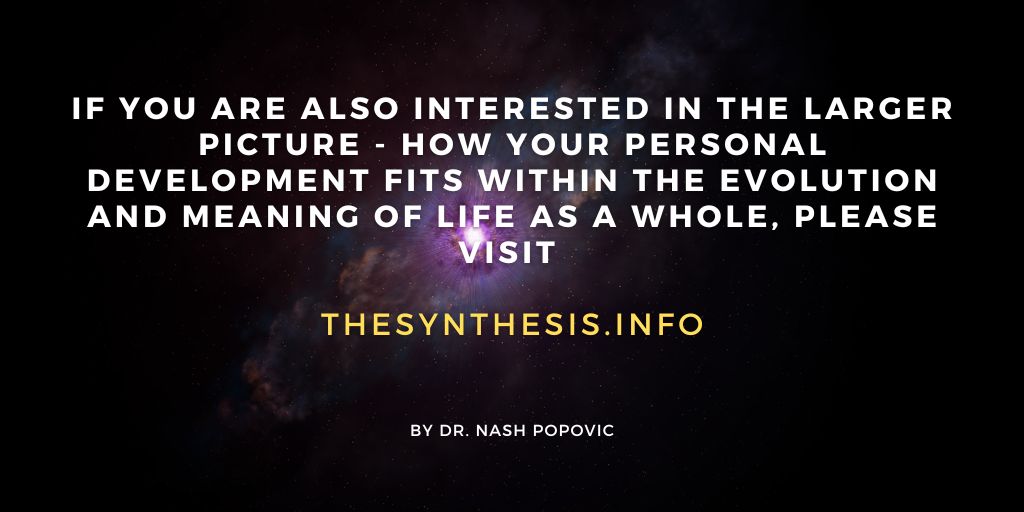16. Personal Development
By virtue of being born to humanity, every human being has a right to the development and fulfilment of his potentialities as a human being.
Ashley Montagu (British-American anthropologist)
We are to some extent a product of our genes and the social environment, but we also create ourselves – to a large degree it is up to us what we will become and how far we will actualise our potential. This is what development refers to.
What personal development is
Remember the time when you were a kid. It is likely that you thought in a different way, liked doing different things or listened to different music. Perhaps you believed that you would stay the same forever, but these things changed – you developed. Development is not the same as aging though. Aging is a natural process that is largely genetically determined; development, on the other hand, is a potential that depends on our efforts and intentions. So, while the body stops growing at some point, then stagnates, and finally starts deteriorating, personal development does not have to. Our experience keeps accumulating, so your development does not ever need to stop – it is all up to you.
The prerequisites of personal development
You can develop in many ways on your own, but this process may be easier and quicker with some assistance (e.g. written materials, teachers or guides). After all, why not benefit from those who have already been on this journey? This does not mean accepting indiscriminately what others say – real development requires reflecting on what you absorb and making sure that you are the one who determines your path. Ultimately, this is your journey! There are many routes of personal development, so assistance is beneficial only if it goes in conjunction with your choice. Development though is not completely effortless, so some level of self-discipline is essential – it will not happen if you give in to inertia. Let’s consider now the types of personal development.
Two types of development
Quantitative
This type refers to developing specific capacities or competences (e.g. skills) – you become better at something. It is indicated by an increase of complexity, integration, and so on. For example, if you keep practising an instrument, you may be able to play more complex pieces of music or play in an orchestra. Besides such specific skills there are more generic ones. Positive psychologists call them strengths and suggest these: curiosity, diligence, open- mindedness, enthusiasm, reasoning, creativity, kindness, carefulness, self-control, appreciation of beauty, courage, communication skills, understanding, fairness, humour, stability, flexibility, determination, skilfulness, moderation, patience.
What are your strengths? How can you use them in a novel way? Which ones would you like to develop further? How can you do it?
Qualitative
A number of psychologists and philosophers(1) have proposed that we don’t only develop particular skills or strengths, but we also go through the qualitatively distinct stages of development. Distilling from many classifications, four such stages are proposed:
- Physical stage at which concrete thinking, bodily instincts and urges, and physical experiences dominate.
- Conventional stage adds to the above social norms and customs, and corresponding feelings (belonging, shame).
- Individual stage is characterised by an ability to reflect, self- determination, and personalised experiences.
- Transcendent stage involves an orientation beyond oneself (e.g. dedication to an ideal, spirituality, or others).
These stages should not be taken hierarchically: being at a further stage does not imply personal superiority(2) (as we can’t say that a year three student is necessarily better than a year two student). Quantitative development matters too, so any aspect of a person can be well or poorly developed at any stage. Further stages do not make life easier either. People just face different challenges.
Some of these stages begin earlier than others though: physical stage starts from birth, social stage starts from about age two, individual stage is usually reached around adolescence, and the transcendent stage may be (but not necessarily) reached in adulthood. The subsequent stages build on and modify the previous ones but they don’t replace them. In fact, any stage may dominate throughout one’s life.
Dimensions of qualitative development
The above stages can be applied to three dimensions (directions):
- Cognitive dimension (thinking): at the physical stage, thinking is concrete, usually about physical things. At the conventional stage, thinking relies on social constructs acquired through one’s family, culture, or religion. The individual stage involves reflection and self-reflection, examining one’s beliefs about the world and oneself. Thinking at the transcendent stage is more abstract and fluid; the focus shifts from objects to relationships and from personal to more universal principles and ideas.
- Dimension of experience: let’s take eating as an example: eating can be a purely physical experience, when the focus is solely on satisfying the physical need. At the conventional stage, cultural embodiment is also important (e.g. a particular setting or type of food, using a knife and fork or chopsticks). At the individual stage personal taste matters, and the transcendent one can perhaps best be described as ‘mindful eating’ , when eating becomes a form of meditation.
- Dimension of agency (will): at the physical stage the person is mainly driven by his or her instincts and urges. At the conventional stage, the reference point for one’s actions is cultural norms. At the personal stage, personal norms, self- expression and autonomy matter, while the transcendent stage involves transcending the personal for the sake of something greater. The reference point is universal norms.
We can be at different stages in each of these three dimensions, which can create an imbalance. If this applies to you, it may be worth considering how to make your development more balanced.
Developmental challenges
Development is an intrinsic drive; it is well known that preventing or inhibiting personal growth causes distress. However, this process has certain challenges that are worth considering:
- Development requires moving on from where you are, which can make you feel exposed, confused and vulnerable. It is vital to recognise that these feelings may be a part of the process rather than a sign of something being wrong with you.
- Development is rarely a straight upward line. Periods of progress are often followed by periods of stagnation or even regress. To avoid frustration, it is important to understand and accept that this is normal. Too rapid development can result in weak integration which, in turn, may lead to losing touch with everyday life and social isolation.
- Your development may create a conflict with others who are not on the same ‘wavelength’. It is important to recognise that you have the right to be different, but they have the right to be different too; different people can still live in harmony and enjoy each other’s company.
- If development is imbalanced, your more developed aspects may start dominating while others wither. So, you may excel in one area of life and remain immature in others.
Your direction
Having a developmental aim can be a guiding light that mitigates the above challenges. This exercise can help you clarify your aim:
Where do I want to be? Imagine yourself in five or ten years. What sort of person would you like to be then, what would you like to achieve in terms of your personal development? What do you need to do now to get there?
Bear in mind though that any aim is projected from where you are now and therefore, it may be at least partly coloured by your own present limitations. So developmental aims should be only provisional and open to change over time.
(1) See, for example, Csikszentmihalyi, M. (1992) Flow. London: Rider p.221 and p.278, and Bee, H.L. (1987) The Journey of Adulthood. New York: Macmillan (chapters 10 and 13).
(2) See Haaften, W. van, Korthals, M., and Wren, T. (eds) (1997) Philosophy of Development. Dondrecht: Kluwer Academic Publishers, p.77.

